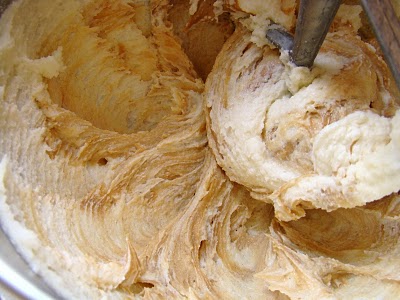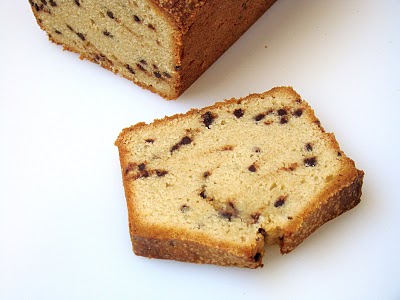 I love the idea of taking something awesome and making it…awesomer. Like a good old-fashioned pound cake, for example. When done right—golden, buttery, a slight crust with a tender crumb—it doesn’t get much better. Unless you add peanut butter. And wee chocolate chips, because it's a natural thing to do. All aboard! The awesomer train is leaving. Am I right? Well, you just hang on there a second.
I love the idea of taking something awesome and making it…awesomer. Like a good old-fashioned pound cake, for example. When done right—golden, buttery, a slight crust with a tender crumb—it doesn’t get much better. Unless you add peanut butter. And wee chocolate chips, because it's a natural thing to do. All aboard! The awesomer train is leaving. Am I right? Well, you just hang on there a second.
 Okay, so. Because we’re friends, I’ll start by saying that I really sort of messed up this recipe. The finished product didn’t really reach its full potential and I totally take responsibility for that. It all started with so much promise—lots of creamy peanut butter swirled into a billowy, silky batter? I mean, come on—but then, then!, I committed one of the Cardinal Sins of Baking. I didn’t read all the instructions carefully enough before I started. Was it due to a tiny person suddenly overturning something heavy onto herself in the other room? Did I suddenly realize I’d forgotten to put on deodorant AGAIN? I’ll never tell. Either way, it was a very straight-C student thing of me to do, glossing over the instructions like that. Thinks of high school, covers face, runs away.
Okay, so. Because we’re friends, I’ll start by saying that I really sort of messed up this recipe. The finished product didn’t really reach its full potential and I totally take responsibility for that. It all started with so much promise—lots of creamy peanut butter swirled into a billowy, silky batter? I mean, come on—but then, then!, I committed one of the Cardinal Sins of Baking. I didn’t read all the instructions carefully enough before I started. Was it due to a tiny person suddenly overturning something heavy onto herself in the other room? Did I suddenly realize I’d forgotten to put on deodorant AGAIN? I’ll never tell. Either way, it was a very straight-C student thing of me to do, glossing over the instructions like that. Thinks of high school, covers face, runs away.
 I’d prepped my (properly-sized) pan with cooking spray and parchment, started with room temperature ingredients, and preheated my oven to the right temperature with my trusty oven thermometer inside to make sure the heat was on point. But! I was a crazy fool and didn’t place my oven rack to the right position within that perfectly heated oven. Wuh-wuuhhhh. So I’ll take one for the team here and be the example of why being a nitpicker about oven rack placement really does matter. I love you guys that much.
I’d prepped my (properly-sized) pan with cooking spray and parchment, started with room temperature ingredients, and preheated my oven to the right temperature with my trusty oven thermometer inside to make sure the heat was on point. But! I was a crazy fool and didn’t place my oven rack to the right position within that perfectly heated oven. Wuh-wuuhhhh. So I’ll take one for the team here and be the example of why being a nitpicker about oven rack placement really does matter. I love you guys that much.
 So you might be saying, “Really, Shauna? Does oven rack placement make THAT big of a difference, or are you just being all Type A on us again?” . Well. The answer is oh, yes (on both accounts, really), and it separates the just okay results from the stellar ones. Most baking recipes will indicate where you should place the oven rack, and most often this will be in the center of the oven, where the heat will hit both the top and bottom of the baking pans with the same intensity and give even browning and baking. I’ve found that in most recipes where oven rack placement isn’t indicated, it’s safe to assume that the center position will give good results (or for things like cookies when you can bake more than one sheet at a time, go for the upper and lower thirds of the oven).
So you might be saying, “Really, Shauna? Does oven rack placement make THAT big of a difference, or are you just being all Type A on us again?” . Well. The answer is oh, yes (on both accounts, really), and it separates the just okay results from the stellar ones. Most baking recipes will indicate where you should place the oven rack, and most often this will be in the center of the oven, where the heat will hit both the top and bottom of the baking pans with the same intensity and give even browning and baking. I’ve found that in most recipes where oven rack placement isn’t indicated, it’s safe to assume that the center position will give good results (or for things like cookies when you can bake more than one sheet at a time, go for the upper and lower thirds of the oven).
 But other recipes, like those for thick, dense cakes like Bundts, loaf cakes, and ahem, peanut butter pound cakes, call for the oven rack to be placed in the lower part of the oven. With more heat hitting the cake from the bottom of the oven, the center will bake thoroughly without the top getting overly browned or burnt during the long bake (usually an hour or more) that these sort of cakes require.
But other recipes, like those for thick, dense cakes like Bundts, loaf cakes, and ahem, peanut butter pound cakes, call for the oven rack to be placed in the lower part of the oven. With more heat hitting the cake from the bottom of the oven, the center will bake thoroughly without the top getting overly browned or burnt during the long bake (usually an hour or more) that these sort of cakes require.
 So if you’ve got a perfectly browned peanut butter pound cake that’s still crazy raw in the middle after an hour, making your total baking time ridiculously longer than what the recipes suggests (and rendering the finished product edible, but undeniably overbaked) then you, too, might be a victim of Oven Rack Placement Issues. Just like me. Sitting here, eating a hunk of peanut butter pound cake with so much potential and great flavor, but an overbrowned crust and “meh” texture due to overbaking. Thinking about how I’ve got to add Oven Rack Placement Issues to all my other issues. I-yi-yi.
So if you’ve got a perfectly browned peanut butter pound cake that’s still crazy raw in the middle after an hour, making your total baking time ridiculously longer than what the recipes suggests (and rendering the finished product edible, but undeniably overbaked) then you, too, might be a victim of Oven Rack Placement Issues. Just like me. Sitting here, eating a hunk of peanut butter pound cake with so much potential and great flavor, but an overbrowned crust and “meh” texture due to overbaking. Thinking about how I’ve got to add Oven Rack Placement Issues to all my other issues. I-yi-yi.
And now that I’ve broadcast the error of my ways, I’m still going to pass this recipe on to you with great faith that you’ll do it the right way. And then report back with your success in the comments section to rub it in. Please and thank you.
 Peanut Butter Pound Cake
Peanut Butter Pound Cake
Adapted from Flo Braker’s recipe in The San Francisco Chronicle Cookbook
Now, the original recipe didn’t include chocolate chips, but I literally could not hold myself back from adding them. It was a moral issue of sorts. You do what you like.
Room temperature ingredients are one of the pillars of great baking, but are seriously important here. With no leavening, all the lift in this cake with come from air incorporated into the batter—you’ll get the most air into the mix with truly room temperature butter and eggs.
Serves 8-10
1 cup (2 sticks) unsalted butter, at room temperature
1 1/2 cups sugar
1/2 cup creamy peanut butter (the commercial stuff, not natural)
5 large eggs, at room temperature
2 cups unsifted all-purpose flour
2/3 mini semisweet chocolate chips
Place an oven rack IN THE LOWER THIRD OF THE OVEN and preheat it to 350 degrees. Lightly spray a 9x5-inch loaf pan with cooking spray and line it with a a strip of parchment paper to create a sling with a bit of overhang on the long sides of the pan.
In the bowl of an electric mixer on medium speed, cream together the butter and sugar until very light and fluffy, about two minutes. Add the peanut butter and beat until well-combined. Scrape down the bottom and sides of the bowl. Beat in the eggs one at a time, beating well after each addition. Reduce the speed to low and blend in the flour in two additions. When just a few streaks of flour remain, pull the bowl from the mixer and fold in the chocolate chips by hand.
Spread the batter into the prepared pan and bake until a toothpick inserted in the center comes out clean, about 60-70 minutes. Let cool in the pan before slicing and serving.






